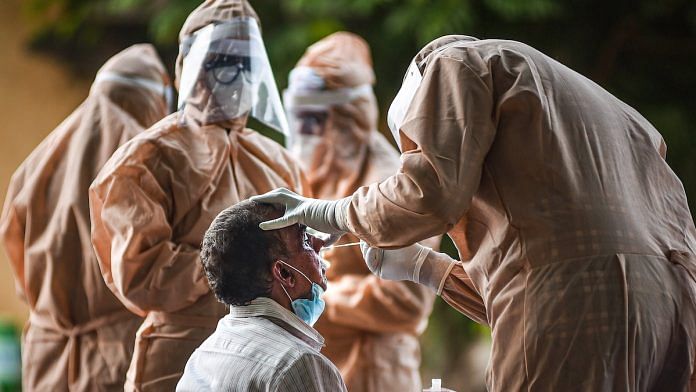New Delhi: While people are slowly learning to live with the highly infectious novel coronavirus, scientists across the world have been looking for newer ways to tackle Covid-19 and manage other challenges related to the pandemic.
Here are some of the latest developments in research on the novel coronavirus.
New gene-editing tool can destroy SARS-CoV-2 inside cells
Stanford University scientists have developed an antiviral agent against Covid-19 that can target and destroy specific genetic strands of the virus inside the human cell.
The tool called PAC-MAN — or Prophylactic Antiviral CRISPR in human cells — has shown promise in the laboratory when tested on human lung cells infected with SARS-CoV-2.
It was initially developed by the team to fight influenza. Like all gene-editing systems, PAC-MAN is composed of an enzyme and a strand of guide RNA.
In this case, the RNA commands an enzyme called Cas13 to destroy specific sequences in the coronavirus’ genome. Using this method, PAC-MAN can neutralise the coronavirus and stop it from replicating inside cells.
PAC-MAN is encased inside synthetic proteins, which are non-toxic to the body and measure just one billionth of a meter wide — about the size of a virus.
The team now plans to test the system in an animal model against a live SARS-CoV-2 virus. They will be joined by collaborators from the New York University and Karolinska Institute in Stockholm, Sweden.
Also read: Scientists develop new AI algorithm to spot Covid-19 in chest X-rays
Convalescent plasma found safe in initial study
Results from the first convalescent plasma transfusion trial in the US, which have been peer-reviewed and published, shows 19 out of 25 patients improving with the treatment. Of these, 11 patients were discharged from the hospital at the time of the study.
The study, published in the American Journal of Pathology, found no adverse side effects caused by the plasma transfusion. According to the researchers, patient outcomes following plasma therapy were very similar to recently-published results of people treated on the antiviral drug remdesivir.
In this study, the therapy was administered as an emergency measure. The team notes that controlled clinical trials are now required to determine its therapeutic efficacy.
The team is planning to conduct a randomised controlled trial that will look more closely at variables such as timing of the transfusion after the onset of symptoms, the number and volume of transfusions adjusted for patient biometrics, antibody levels in donor plasma and numerous other parameters needed to effectively evaluate how to optimise this therapy.
AI to help predict disease severity in Covid-19 patients
Scientists at the New York University have developed a mobile app that can help clinicians determine which patients with Covid-19 are likely to have severe cases.
The app uses artificial intelligence (AI) to analyse biomarkers from blood tests, and produces a “severity score” for Covid-19.
Researchers have said that identifying and monitoring those at higher risk for severe cases may help hospitals prioritise care and allocate limited resources like ICU beds and ventilators.
Using data from 160 hospitalised Covid-19 patients in China, the researchers identified four blood biomarkers that were present in high levels in patients who died, compared to those who recovered: C-reactive protein (CRP), myoglobin (MYO), procalcitonin (PCT), and cardiac troponin I (cTnI).
The team used a machine learning algorithm to define the patterns of Covid-19 and predict its severity.
When a patient’s biomarkers and risk factors are entered into the model, it produces a Covid-19 severity score ranging from 0 (mild or moderate) to 100 (critical).
The team validated the model using data from more than 1,000 New York City Covid-19 patients. The mobile app can now be used at point-of-care to quickly calculate a patient’s severity score, researchers have claimed.
Fear of Covid-19 preventing heart patients from timely treatment
The number of heart attack patients seeking urgent hospital care has dropped by more than 50 per cent during the Covid-19 outbreak, according to a worldwide survey.
Fear of catching the coronavirus means even people in the midst of a life-threatening heart attack are too afraid to go to a hospital for life-saving treatment, according to Barbara Casadei of European Society of Cardiology (ESC), the organisation that conducted the survey.
This is despite the fact that the risk of dying from a heart attack is much greater than of Covid-19. Cardiac death is also largely preventable if patients with a heart attack come to a hospital in time.
The ESC survey of 3,101 healthcare professionals in 141 countries was conducted in mid-April.
The vast majority of physicians and nurses who participated in the survey reported a drop in the number of patients suffering from severe heart attacks coming to a hospital. On average, they reported a 50 per cent decrease.
In addition, most respondents said that of those patients who did go to hospital, 48 per cent arrived later than usual and beyond the optimal window for urgent treatment.
Also read: How Trump, Modi and a low price tag made 80-year-old HCQ a political hot potato



